We recently recapped some of our time at the PlayStation Experience expo two weeks ago in Las Vegas, but that roundup only included the biggest first-party games coming to the PlayStation 4 in 2015. The showcase was also packed to the gills with some intriguing third-party titles, as well as ample evidence of Sony's commitment to putting some of the best indie games on its consoles.
-
Welcome to our PSX Las Vegas gallery! This also includes blurbs about a few games that didn't quite make our indie roundup.
-
That inFamous: Second Son figurine you've always wanted.
-
Hella merch.
-
PSX show floor.
-
An honorable mention goes to We Are Doomed, a twin-stick shooter with a flamethrower as a main weapon and a heavy stress on crowd control. "It's funny, both Microsoft and Sony say the same thing in terms of how to best make games for multiple platforms these days: USE UNITY," creator Mobeen Fikree told Ars. He then clarified that he's "crazy" and made his game in C++.
-
The instruction manual to Keep Talking And Nobody Explodes, a Project Morpheus headset game that we've previewed before.
-
What's a Vegas games show without a flashy car?
-
More flashy car.
-
Not quite as flashy, but these Gran Turismo 6 car-seat rigs enjoyed a long line throughout the PSX's duration.
-
Sony offered a pretty cool series of official classes for level creators in LittleBigPlanet 3.
-
Yoshinori Ono made a few fans' dreams come true!
-
Harmonix's Kickstarter-fueled reboot of the Amplitude series came to PSX in the form of a four-player demo. We weren't really all that moved by it, to be honest, though that might be because we wore ourselves out playing the incredibly similar Rock Band Blitz spinoff a few years ago.
-
Don't worry, Minecraft fans; Microsoft hasn't stopped the game from appearing at other companies' expos just yet.
-
Just in time for the Final Fantasy VII "reboot."
-
Journey means friendship.Sam Machkovech
-
The limited-edition, PS1-themed PlayStation 4 system, protected under glass so that nobody would run off and sell it on eBay for over $1,000.
In some cases, like From Software's Bloodborne and EA's Battlefield: Hardline, we saw playable demos with slightly new content but nothing largely different from what we'd seen at other expos. (A quick primer: we're stoked on Bloodborne as a next-gen followup to the brutally difficult Dark Souls, and we refuse to get jazzed about a snappy-looking Battlefield game until we see one without performance issues that take months to fix.)
In other PSX cases, we were vastly underwhelmed. We had few kind words for Tearaway: Unfolded, the PS4-exclusive follow-up to the touch-and-twist 2013 Vita platformer; the original game's charm felt diluted by its clunky transition to the DualShock 4 controller. Worse was Fat Princess Adventure, a four-player co-op adventure whose playable demo recalled the slow pacing and boring combat of Fable: Legends in all of the worst ways.
Lucky us, the show floor was smothered in indie demo after indie demo after indie demo. Sony went to great lengths to show off games destined to have their console launches on PlayStation systems (meaning they'll probably be on Steam the same week, if not before). That means console owners who've soaked up the small-fry likes of Towerfall: Ascension and Road Not Taken have even more to look forward to in 2015. Here are a few highlights:
Severed
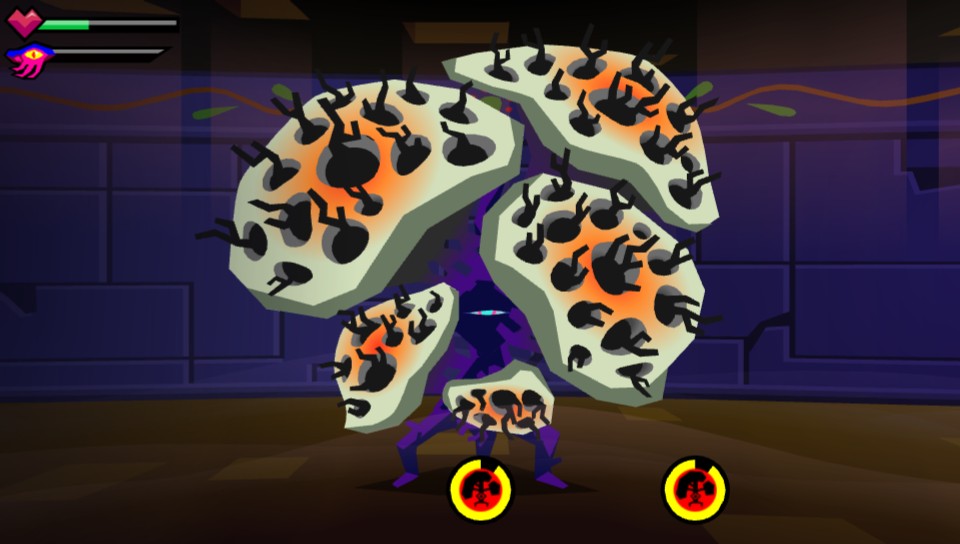
Were this an event like E3, complete with "Best In Show" tags slapped onto every podium, we might have slapped an Ars Technica logo and some giant hearts on this PlayStation Vita game. This first-person dungeon-delving RPG doesn't look or feel anything like similar genre reboot Legend of Grimrock, even though both share a surface similarity of on-rails traversal.
Severed stands out in a few ways. For one, its on-rails control and slow pacing combine to allow the developers to tell stories via stark visual detail. Drinkbox Studios, the makers of Guacamelee, put their desert-tinged Techicolor chops to great effect in building a gorgeous mix of destroyed homes, harrowing caves, and tropical jungles, and each 90-degree turn you take unveils yet another set piece worth staring at and dissecting to figure out what your lead character has suffered and her quest to come.
Even better than that is the game's touchscreen-centric battle system, which surrounds players with enemies at every angle that must be blocked and countered with taps and swipes. The bottom of the screen flashes with prompts when the enemies behind or beside you are about to strike, and managing this system felt refreshing in an otherwise staid world of RPG battle mechanics. This is exactly the kind of touch-powered game Vita needs if Sony expects people to continue caring about its little handheld-that-could. We'll be first in line to play this one when it launches in 2015.
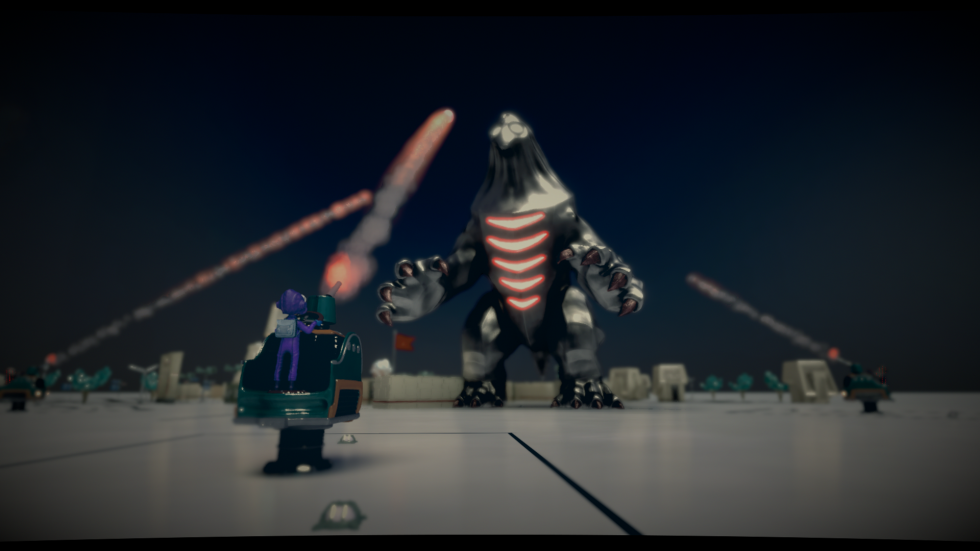
The Tomorrow Children: Game design legend Dylan Cuthbert (X, Star Fox, most PixelJunk games) has done it again, though we wouldn't be surprised if we're the only people who think so. The Tomorrow Children is, put simply, a Marxism simulator. The game's premise lives and dies on the idea that players in a single session will collaborate toward collective goals; in short, this is the utter frigging opposite of individualist survival sims like DayZ and Rust.
As a way to encourage selfish players to dive into this game's slow controls, resource management, and collective building projects, The Tomorrow Children's all-seeing "administrator" keeps tabs on every action you do for the good of the state, then rewards you with individual currency points to be spent on vehicles, weapons, and more. We didn't have time to see how this slow-burning game unfolded, but we were told all matter of monster-loaded conflict eventually descends upon players' hub cities, which players in the demo were building and exploring to prepare for. Still, the resource-gathering systems, the super-easy rocketpack controls, and the gorgeous, Russian-doll aesthetic had us hooked enough to wonder how the game will evolve both before and during its launch.
The Witness
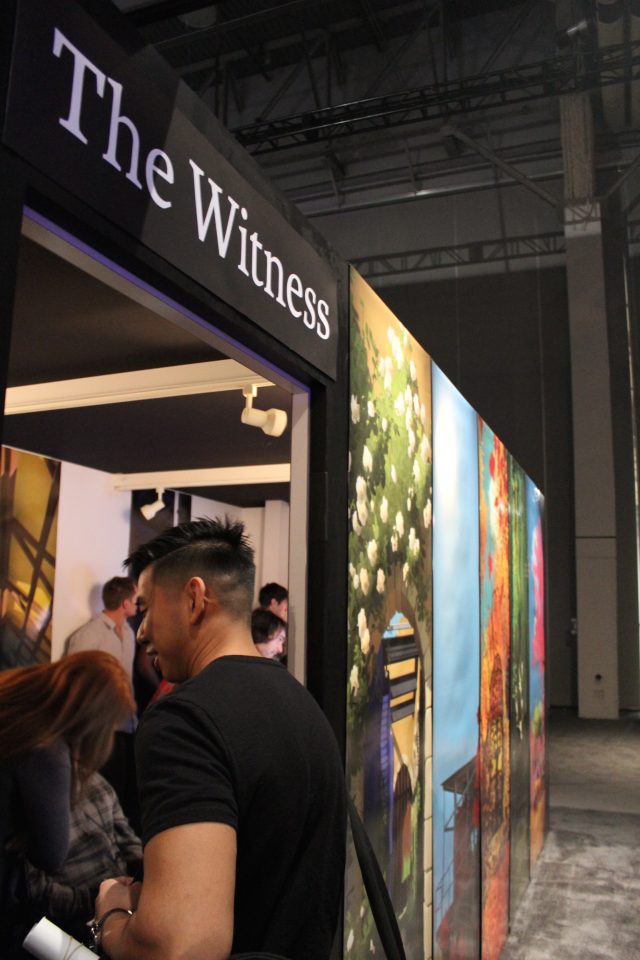
Yes, Jonathan Blow's long-awaited follow-up to Xbox Live Arcade smash Braid still exists. We first tried an early test version of The Witness all the way back in 2010 and continued to see it evolve as Blow and his team have continued polishing and refining the game's hub island in the years since. The PSX demo, housed in a walled-off room, looked like near-final stuff to us, though Blow didn't confirm anything resembling a release date just yet.
Forget the likes of Myst; a few steps into Blow's new creation, and you'll feel like you've been transported to the most compelling puzzle-loaded island ever made. Its watercolor aesthetic makes outdoor scenes look vast and colorful, while interiors would have enough visual trickery and gorgeous architectural touches to entice players. But the game's real meat is in the puzzles themselves, which were even more impressive. They all appear to be interconnected, designed to offer ah-ha moments on the island's opposite ends that will have players running with fresh solutions in their brains to solve some of the hardest, most obtuse crap they've ever seen in a game.
Miegakure
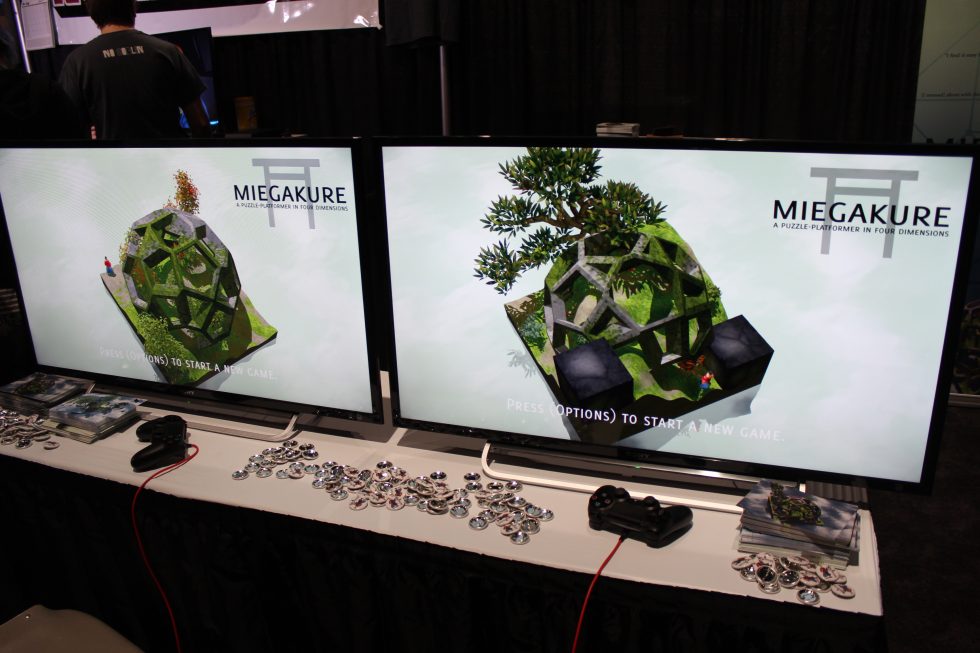
"It's hard work to make an intuitive four-dimensional game!" Miegakure creator Marc ten Bosch once told us when trying to explain the weirdness of his mind-melting puzzle game. His title, too, has seemingly been in development forever, but its presence at PSX was proof that its PS4 build was proceeding pretty well, complete with introductory play that asks—and nearly answers—the question of how humans might navigate a fourth dimension of space and time.
Like most other puzzle-platformers, Miegakure presents seemingly impassable sections for players to figure out; in normal 3D movement, this game's levels are literally unsolvable. The gimmick here is that the game allows players to flip the known universe on a fourth-dimensional axis, exposing an entirely new, previously unseeable viewpoint on the once impassable blockades and paths that players can then squeeze through. Upon the game's launch, we will surely spend a lot of time mathematically analyzing how its extra-dimensional movement works, exactly. We can't wait to geek out on it.
Capsule Force
PSX hosted quite a few couch-friendly, four-player combat games, including the simple-yet-elegant Rockets Rockets Rockets and the laser-crazy sports-ish game Gunsport, but we were most partial to Capsule Force, a 2D platform-brawler that combined a Neo Geo aesthetic and a Nidhogg-styled level-control mechanic.
Players must carry a ball all the way to the left (or the right) of a series of screens, but the only way to advance those screens in your favor is to jump on moving platforms. That may sound confusing, but the reason this system works is because no matter what players do, everyone stays on the same screen, scroll-warping from edge to edge in Pac-Man fashion. That makes ball carriers that much more vulnerable as they try to make progress toward their team's goal posts. Instead of chasing a successful ball carrier, defenders can stay still and have a better chance of aiming a charged laser at happy-go-lucky foes.
Capsule Force's biggest knock, like the show's other couch-friendly gems, was its lack of depth; we'd love some of these games to combine forces and launch as a combined, Sportsfriends-styled package. In the meantime, PSX's wealth of couch-friendly content made it very clear that PS4 owners would be wise to stock up on DualShock 4 controllers for future party play.
Rocket League
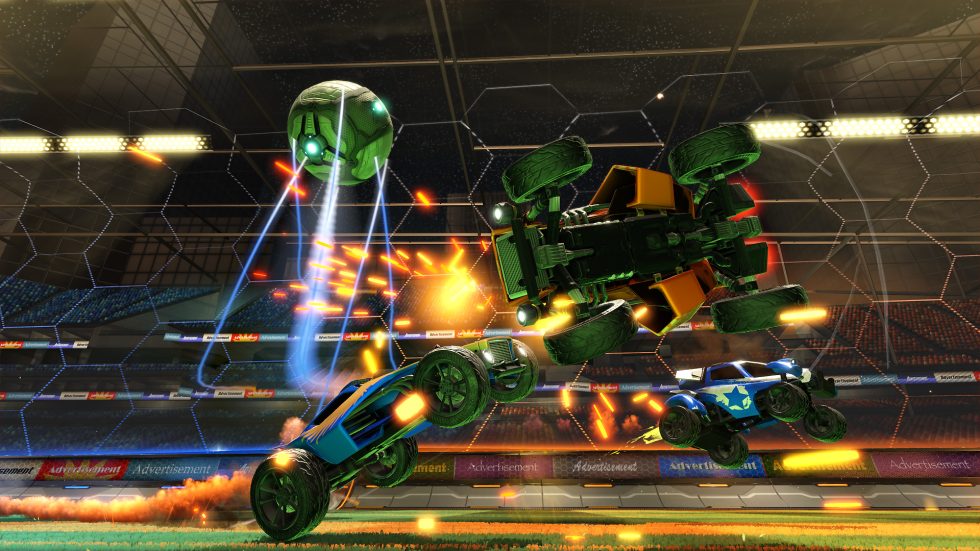
We were tempted to lump Rocket League into the prior blurb, even though it too is a couch-friendly sports-ish game, but there's something special to it. Namely, this is the car-combat game that we've spent over a decade wishing existed.
Car-crazy games like Twisted Metal, Vigilante 8, and Mario Kart offered legendary battle modes, but they were all hampered by the limitations of car control—of the inability to immediately stop, pivot, and dodge at a moment's notice to deal with issues like a just-passed-by competitor. What we love about Rocket League, a pure soccer-styled experience, is that its cars can boost into the air and trigger side and rear thrusters at will. Zip into the air, rotate in mid-air, and ram your super-car into a giant soccer ball to score a game-changing goal.
Until Nintendo gets its act together and announces a Wii U sequel to the phenomenal Mario Strikers Charged, we're putting the high-speed, San Francisco Rush-styled Rocket League at the top of our high-octane, action-soccer list.
Listing image by Sam Machkovech
reader comments
25